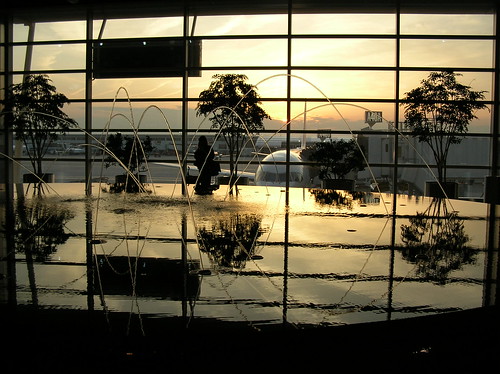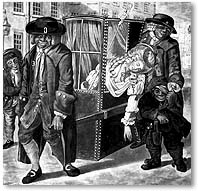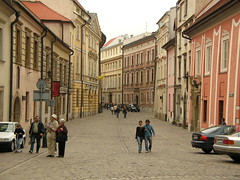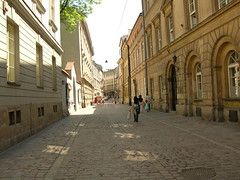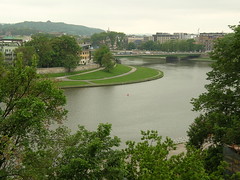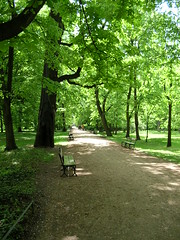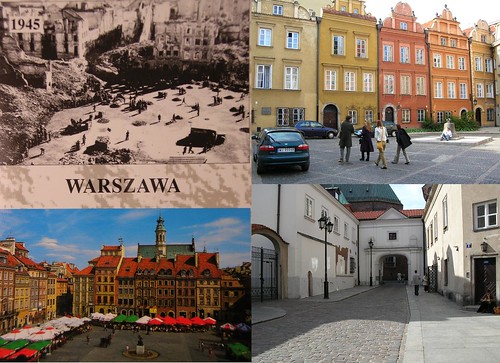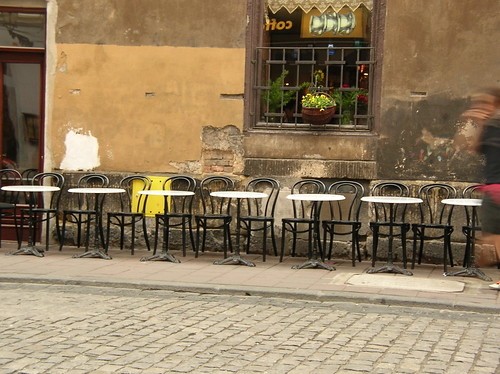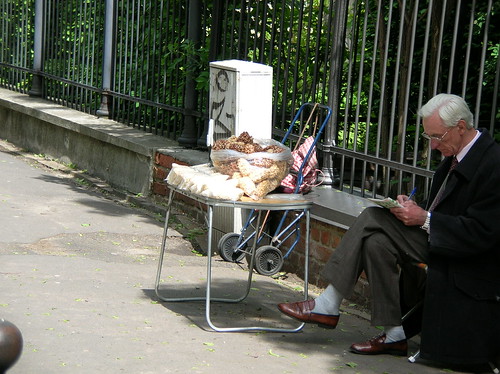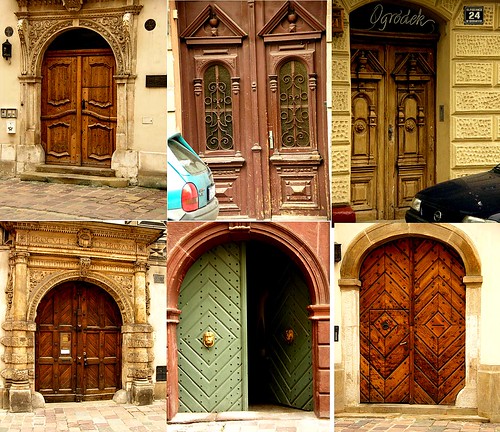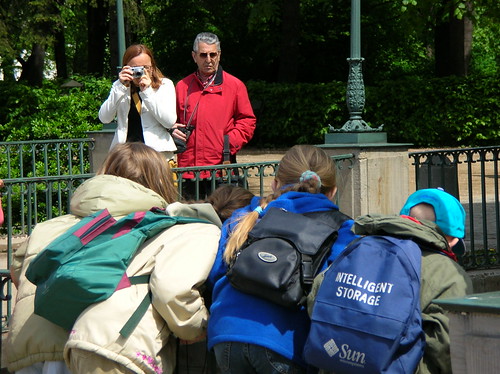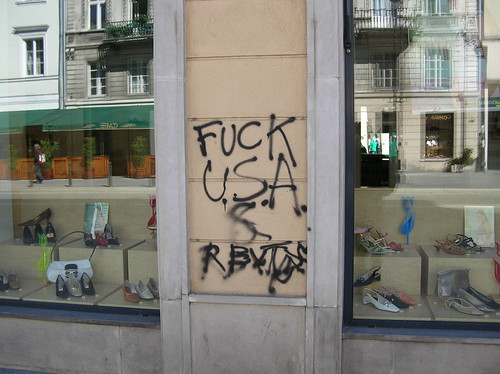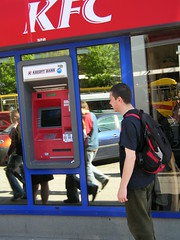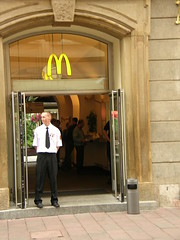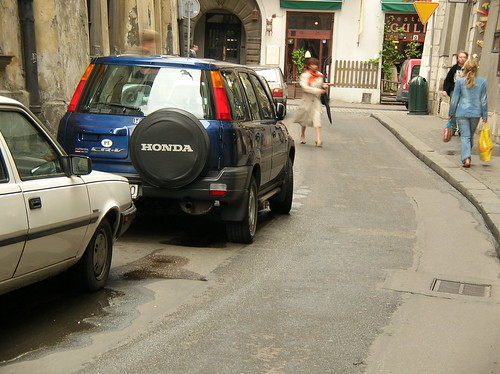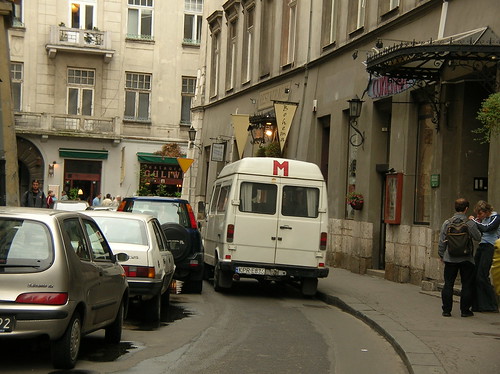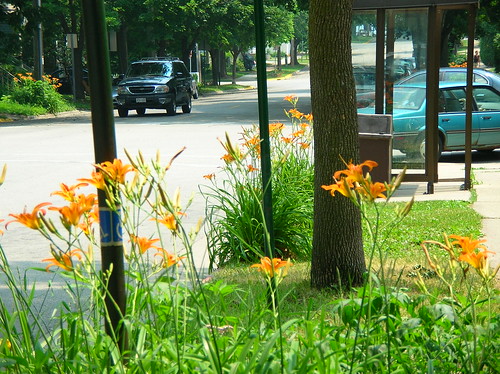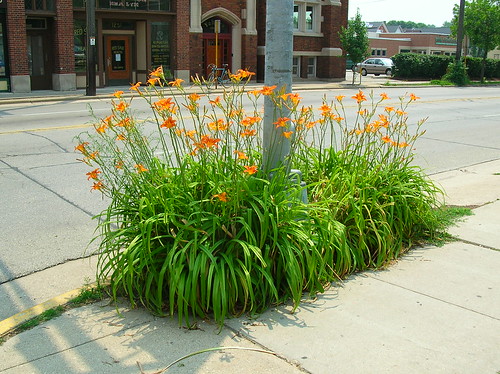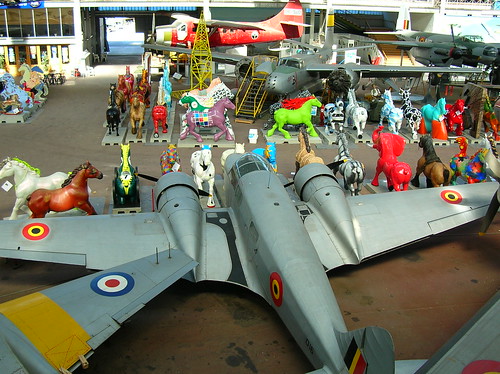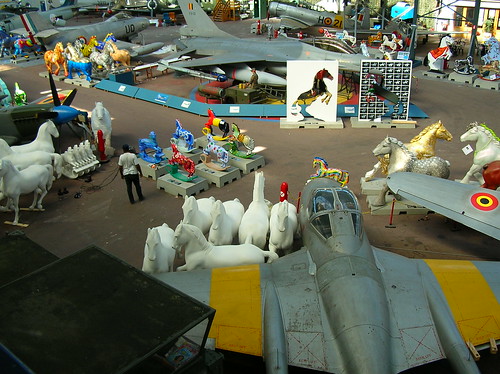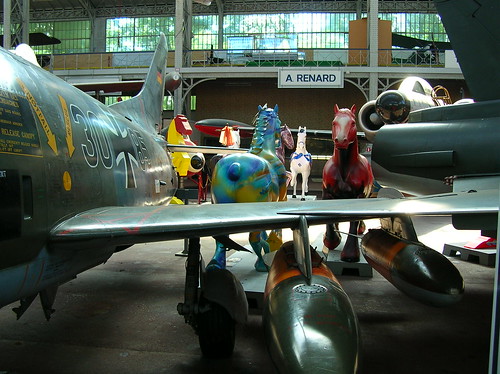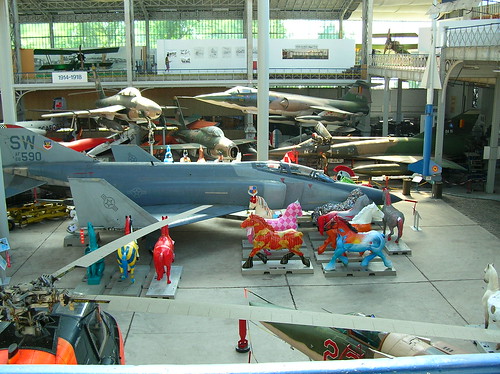Thursday, June 30, 2005
Did I mention?
My German host at U of Boogie, a law professor, told me that when he traveled in the U.S. a couple of years ago (post 9/11), he told his American hosts that if he went missing for more than 12 hours, would they please make urgent inquiries to federal authorities about whether he was being detained incognito.
So that's the deal. You know how travelers tend to have a heightened perception of local dangers in their travel destinations? "If you go to New York, you'll be mugged or shot on the subway." "If you go to Italy, you'll be kidnapped." "If you take the train from Krakow to Prague, you'll be knocked unconscious with chloroform spray and robbed."
For well-informed Europeans it's, "If you go to the United States, you can be arrested and detained indefinitely in secret." How's that for a perception of the world's leading democracy?
***
So that's the deal. You know how travelers tend to have a heightened perception of local dangers in their travel destinations? "If you go to New York, you'll be mugged or shot on the subway." "If you go to Italy, you'll be kidnapped." "If you take the train from Krakow to Prague, you'll be knocked unconscious with chloroform spray and robbed."
For well-informed Europeans it's, "If you go to the United States, you can be arrested and detained indefinitely in secret." How's that for a perception of the world's leading democracy?
***
They've done it
I wouldn't have thought it possible, but the Bush Administration has managed (for me) to completely debase the word "freedom." (Not the idea -- just the word.) I noticed this when glancing at the cover of today's New York Times, and registering my reaction to the story about the "Freedom Tower" to be built on the World Trade Center site. I thought, "For goodness sakes, did you really have to name it that?"
The meaning of "freedom" in today's Bushrovian politics is "keyword for opportunistic use of the 9/11 tragedy for political gain." It means: "not French." Nice work guys, a real feather in your cap.
I suppose the intended meaning of calling it the "Freedom Tower" is to show that the terrorists' attack on the World Trade Center (1) was an attack on our freedom, and (2) was unsuccessful.
But the irony is that the terrorist attack is not a direct attack on our freedom. In contrast to, say, Hitler's conquests which directly attacked the freedom of the western European liberal democracies, the 9/11 terrorism attacked our freedom indirectly. The mediating mechanism was of course -- as the terrorists surely understood -- the reactions of our leaders: to what extent would our own leaders undermine our freedoms in response to 9/11.
As a defender of freedom, the Bush Administration has been weak. We have the USA PATRIOT Act, thousands of detainees denied our constitutional procedural protections, the voting public manipulated and misled about the war in Iraq, restrictive Keystone-cop security procedures ... The limited extent to which the attack on our freedom has succeeded has resided to a large extent in the Bush Administrations responses.
So I find this "freedom"- naming thing to be all wrong.
***
The meaning of "freedom" in today's Bushrovian politics is "keyword for opportunistic use of the 9/11 tragedy for political gain." It means: "not French." Nice work guys, a real feather in your cap.
I suppose the intended meaning of calling it the "Freedom Tower" is to show that the terrorists' attack on the World Trade Center (1) was an attack on our freedom, and (2) was unsuccessful.
But the irony is that the terrorist attack is not a direct attack on our freedom. In contrast to, say, Hitler's conquests which directly attacked the freedom of the western European liberal democracies, the 9/11 terrorism attacked our freedom indirectly. The mediating mechanism was of course -- as the terrorists surely understood -- the reactions of our leaders: to what extent would our own leaders undermine our freedoms in response to 9/11.
As a defender of freedom, the Bush Administration has been weak. We have the USA PATRIOT Act, thousands of detainees denied our constitutional procedural protections, the voting public manipulated and misled about the war in Iraq, restrictive Keystone-cop security procedures ... The limited extent to which the attack on our freedom has succeeded has resided to a large extent in the Bush Administrations responses.
So I find this "freedom"- naming thing to be all wrong.
***
Airports
--oo000oo--
A surprisingly pretty airport in a major U.S. metropolis. Most excellent fountain.
It’s a commonplace to say that airports are the same all over the world, and broadly speaking they are, but there are fun differences that let you know you’re in another country.
Take Schiphol Airport in Amsterdam. Do you find big flower seed-and-bulb shops in U.S. airports? You sure don’t, but they’re all over this one. Plus, all the people who work there are Dutch!
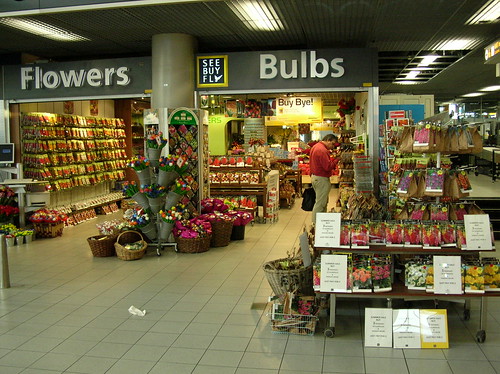
In Amsterdam Schiphol, they also have this great feature – public shaming sanctions for tardy travelers. We repeatedly heard this annoucement, from an authoritative female voice in heavily Dutch-accented English:
“Passengers Smith and Jones, for KLM flight 921 to London, you are delaying the flight. Please proceed immediately to the gate or we will afloat your luggage.”How great is that -- the offenders’ luggage to be jettisoned into the North Sea! (I eventually figured out that “afloat” was Dutch-accented English for “off-load,” but still... way cool.)
Krakow airport’s food stand offers an assortment of dishes, and at prices, you wouldn’t find in any U.S. airport. Check out that cold herring salad plate – cost – about $1.
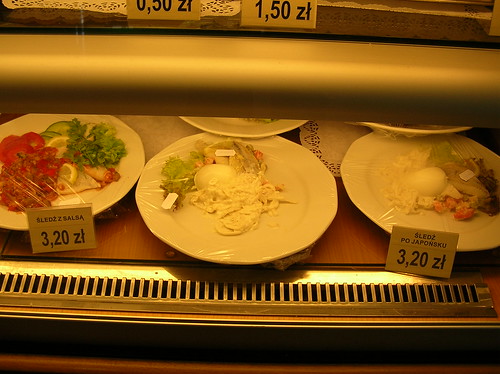
In Poland, the passport control officers carry sidearms, and the female officers’ uniforms entail skirts and pumps with two-inch heels. Talk about your action flick fantasy – chicks in heels with guns! (Sorry, but you can understand my reluctance to try to snap a picture.)
I did take a picture of the arrival and departure monitors, however. I love the word "odlot" for outbound flight.
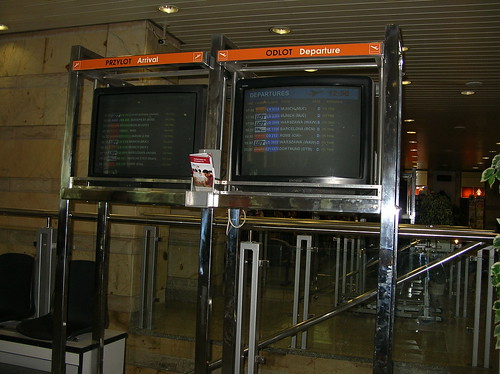
I'm guessing that "Lot" in Polish means "fly" or "flight" (too lazy to dig out my Polish-English dictionary) -- hence their national airline, "Lot" -- and "od" means "out" or something.
I previously mentioned how, at Krakow International, we waited on a bus on the runway for about 5-10 minutes to take us to the plane. What I didn't mention was that they kindly allow you to keep an eye on your luggage while you wait.
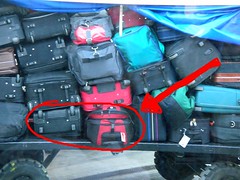
Photo taken from runway bus, Krakow.
**
2100 Steps
So the "dietary guidelines" people at U.S. Dept of HHS tell us that you can get credit for your 30-90 minutes of almost-daily exercise by walking 10,000 steps.* Maybe that's true -- or maybe it's propaganda with HHS shilling for the powerful pedometer industry.
_____
*So what's the deal -- USDA is in charge of the food part of diet, but HHS is in charge of exercise? Or does every federal department have its dietary guidelines?
_____
In any event, I have recently discovered that a round trip walk to my favorite coffee shop, Grandma Moses, is exactly 2100 steps.
Yes, I've come back to coffee again -- take a moment TO GET OVER IT. Okay, ready to go on?
How did I discover that it was exactly 2100 steps? I counted. Actually, I counted one way and multiplied by two.
I think you see where this is going. How am I going to put in the additional 7,900 steps?
I suppose I could make five trips to Grandma Moses every day, but unless I actually get coffee every time, then it's the moral equivalent of just walking around a track. but if I do get five cups of coffee, then I am probably exceeding federally recommended caffeine guidelines. I suppose I could get tea, but that would be the moral equivalent of just walking around a track.
On further reflection, it's not like I'm carried around in a sedan chair when I'm not walking to Grandma Moses. So I'm making up a lot of those steps throughout my day.
Because it's incredibly tedious to count steps -- and so easy to lose your count -- I'm thinking about getting one of those pedometers. My concern is that I'll become an insufferable bore. If you have a pedometer, is it possible to resist telling people how many steps it is from various points A to points B? Like this post?
**
_____
*So what's the deal -- USDA is in charge of the food part of diet, but HHS is in charge of exercise? Or does every federal department have its dietary guidelines?
_____
In any event, I have recently discovered that a round trip walk to my favorite coffee shop, Grandma Moses, is exactly 2100 steps.
Yes, I've come back to coffee again -- take a moment TO GET OVER IT. Okay, ready to go on?
How did I discover that it was exactly 2100 steps? I counted. Actually, I counted one way and multiplied by two.
I think you see where this is going. How am I going to put in the additional 7,900 steps?
I suppose I could make five trips to Grandma Moses every day, but unless I actually get coffee every time, then it's the moral equivalent of just walking around a track. but if I do get five cups of coffee, then I am probably exceeding federally recommended caffeine guidelines. I suppose I could get tea, but that would be the moral equivalent of just walking around a track.
On further reflection, it's not like I'm carried around in a sedan chair when I'm not walking to Grandma Moses. So I'm making up a lot of those steps throughout my day.
Because it's incredibly tedious to count steps -- and so easy to lose your count -- I'm thinking about getting one of those pedometers. My concern is that I'll become an insufferable bore. If you have a pedometer, is it possible to resist telling people how many steps it is from various points A to points B? Like this post?
**
Wednesday, June 29, 2005
What jury would convict a man whose name sounds like a Muppet?
Ten things about Poland
Hey, here's a great idea for a meme: your ten most notable impressions of Poland! Me first:
1. Subtle beauty. Poland is like the midwest of Europe: a “flyover” country whose beauty and interesting qualities are easy to miss, but are there for those who care to look for it. Both Warsaw and Krakow are vibrant cities, in very contrasting ways. Warsaw has big city buzz, a thriving arts scene, urban edge. Krakow is a beautiful medieval city filled with Polish and international students: one part tourist eye candy, one part college town. The Polish countryside, with its rolling pastoral landscapes, is quite lovely. And I didn’t even make it down to the gorgeous Carpathian mountains. (See Nina's pics, here and here.)
2. Food. Travel in Poland is something of a bargain. Food costs about half of what it does in the U.S., and you can eat very well. You can get very good European-style coffee everywhere, and – who’d have thunk it? – Polish chocolate is as good as any I’ve had in Europe. Again, see Nina's pics. (Go here and just scroll and scroll.) (This was my plate, I think.) Sorry to be a broken record, but Nina may be the best food photo-blogger in the world.
3. Getting around. For a tourist, it’s surpisingly easy to get around. In Warsaw and Krakow, most Poles speak some English, and many speak English quite well – though if you ask them, they always modestly claim that they can speak only a little English. Ironically, those who speak the least English seem to be the folks who work the infrastructure – train stations, buses, the post office, even the tourist information booths. (Perhaps because these are public sector jobs?)
4. Transportation. Although the public transportation – buses and streetcars – seemed plentiful, we didn’t make the effort to figure out how to use them because the cities were very walkable and the taxis inexpensive. A few times, it seemed as though the taxi driver was purposely overcharging us, but why fight over what amounted to about a dollar or two?
5. Eyedar issues. I got busted by eyedar many times: The women in Poland, to make a gross generalization, are strikingly good-looking. The men, apparently, not so much. This latter impression was gleaned from two facts. First, B complained about the lack of good scoping. Second, I seemed to be getting checked out by women a lot, which never happens to me back home. Though perhaps I was getting geek-checked due to the camera hanging around my neck.
6. Ambivalence. Maybe Poland’s complex and interesting history of partitioning, being erased from the map and re-established, of shifting borders that now include swaths of former German and Ukrainian territory, of being dragged into communism and then transitioning back into capitalism, has made an impression on the Polish psyche – why shouldn’t it?
I experienced this in the form of a strong impression of Poles’ ambivalence toward foreign tourists. I’m not one of these monied travelers who looks for obsequious smiles and ingratiating service, but I tend to be friendly in day-to-day encounters and to look for the same in return. More often than not, the people I dealt with were brusque and unsmiling. The advice I got that Poles “really appreciate it” when you make an effort to approach them initially with a phrase in Polish (I got good at saying “do you speak English” in Polish) or to thank them with a “dzienkuje” worked maybe a third of the time.
Things were different when we were with Nina. I don’t know whether it was her fluent Polish, or her great personal charm, but we almost invariably got spillover friendliness from people with Nina as our guide. At our hotel in Krakow, where we checked in a day ahead of Nina, the desk clerks gave us a substantial room upgrade the day after we exchanged big hugs with Nina in front of them in the hotel lobby.
7. Getting stared at. Poles – particularly Polish men – are big starers. I’m not talking about now about checking out the eye candy. Just staring. If they think there’s something unusual about you, or if you look different – i.e., like a tourist, or not Polish – Poles seem to think nothing about gawking right at you. Several times, it wasn’t just gawking, it was glaring. You really know you’ve been stared at when you get the evil eye from a 20-something Polish skinhead on a commuter train to the countryside for half an hour straight. If you look at them in the eye, the starer will look away. But it can get uncomfortable.
8. Diversity. Poland doesn't have the history of colonialism that has produced a lot of the ethnic diversity seen in many western European countries. Today, Poland has minimal ethnic diversity. On the Warsaw subway during rush hour, my impression was “never have I been so crammed into a subway car with so many white people.”
9. “Excuse me.” When traveling in a foreign country where I don’t know the language, I think it’s important to learn a few phrases, one of which should always be “excuse me.” It’s inevitable that you will bump into people or have to squeeze past them, and I certainly don’t like being jostled without some sort of slightly apologetic acknowledgment. In Poland, the phrase (pronounced psheh-pra-shem) means “excuse me” in both English senses: “I beg your pardon” and “may I have your attention for a moment?” and is thus a very useful word.
I found it useful in the first sense, but not the second. I was jostled in Poland as much as in New York City, at least once a day. Not a big deal. Never did anyone say excuse me -- not once! -- but to their credit, the Poles are fair about this: no one gave me an angry look for jostling them or gave any indication that I was to say “excuse me” to them.
10. Conclusion: Go to Poland. Okay, so I could have done without the staring and the brusqueness, but come on: would you skip going to New York City because people are rude, the streets are dirty, and it has had high crime rates in the past? Would you miss Paris because many shopkeepers, hotel desk clerks and bus driver will give you lots of attitude? Every place you could visit has some imperfections, but Poland’s minuses are heavily outweighed by its pluses. We had a wonderful eight days there.
And if you possibly can, go to Poland with Nina.
***
Randomly-selected streets, Krakow. [Warning: photos in this
post do not necessarily match the text!]
post do not necessarily match the text!]
1. Subtle beauty. Poland is like the midwest of Europe: a “flyover” country whose beauty and interesting qualities are easy to miss, but are there for those who care to look for it. Both Warsaw and Krakow are vibrant cities, in very contrasting ways. Warsaw has big city buzz, a thriving arts scene, urban edge. Krakow is a beautiful medieval city filled with Polish and international students: one part tourist eye candy, one part college town. The Polish countryside, with its rolling pastoral landscapes, is quite lovely. And I didn’t even make it down to the gorgeous Carpathian mountains. (See Nina's pics, here and here.)
The Vistula River winds through both Krakow (here) and Warsaw.
Neo-classical building facades, Krakow.
2. Food. Travel in Poland is something of a bargain. Food costs about half of what it does in the U.S., and you can eat very well. You can get very good European-style coffee everywhere, and – who’d have thunk it? – Polish chocolate is as good as any I’ve had in Europe. Again, see Nina's pics. (Go here and just scroll and scroll.) (This was my plate, I think.) Sorry to be a broken record, but Nina may be the best food photo-blogger in the world.
3. Getting around. For a tourist, it’s surpisingly easy to get around. In Warsaw and Krakow, most Poles speak some English, and many speak English quite well – though if you ask them, they always modestly claim that they can speak only a little English. Ironically, those who speak the least English seem to be the folks who work the infrastructure – train stations, buses, the post office, even the tourist information booths. (Perhaps because these are public sector jobs?)
Lazienki Park, Warsaw.
4. Transportation. Although the public transportation – buses and streetcars – seemed plentiful, we didn’t make the effort to figure out how to use them because the cities were very walkable and the taxis inexpensive. A few times, it seemed as though the taxi driver was purposely overcharging us, but why fight over what amounted to about a dollar or two?
The Poles painstakingly restored Warsaw's Old Town after its destruction
by the Germans in the Warsaw Uprising of 1944.
by the Germans in the Warsaw Uprising of 1944.
5. Eyedar issues. I got busted by eyedar many times: The women in Poland, to make a gross generalization, are strikingly good-looking. The men, apparently, not so much. This latter impression was gleaned from two facts. First, B complained about the lack of good scoping. Second, I seemed to be getting checked out by women a lot, which never happens to me back home. Though perhaps I was getting geek-checked due to the camera hanging around my neck.
6. Ambivalence. Maybe Poland’s complex and interesting history of partitioning, being erased from the map and re-established, of shifting borders that now include swaths of former German and Ukrainian territory, of being dragged into communism and then transitioning back into capitalism, has made an impression on the Polish psyche – why shouldn’t it?
I experienced this in the form of a strong impression of Poles’ ambivalence toward foreign tourists. I’m not one of these monied travelers who looks for obsequious smiles and ingratiating service, but I tend to be friendly in day-to-day encounters and to look for the same in return. More often than not, the people I dealt with were brusque and unsmiling. The advice I got that Poles “really appreciate it” when you make an effort to approach them initially with a phrase in Polish (I got good at saying “do you speak English” in Polish) or to thank them with a “dzienkuje” worked maybe a third of the time.
Things were different when we were with Nina. I don’t know whether it was her fluent Polish, or her great personal charm, but we almost invariably got spillover friendliness from people with Nina as our guide. At our hotel in Krakow, where we checked in a day ahead of Nina, the desk clerks gave us a substantial room upgrade the day after we exchanged big hugs with Nina in front of them in the hotel lobby.
Old-world sidewalk cafe across the street from the modish "Coffee Republic," Krakow.
7. Getting stared at. Poles – particularly Polish men – are big starers. I’m not talking about now about checking out the eye candy. Just staring. If they think there’s something unusual about you, or if you look different – i.e., like a tourist, or not Polish – Poles seem to think nothing about gawking right at you. Several times, it wasn’t just gawking, it was glaring. You really know you’ve been stared at when you get the evil eye from a 20-something Polish skinhead on a commuter train to the countryside for half an hour straight. If you look at them in the eye, the starer will look away. But it can get uncomfortable.
8. Diversity. Poland doesn't have the history of colonialism that has produced a lot of the ethnic diversity seen in many western European countries. Today, Poland has minimal ethnic diversity. On the Warsaw subway during rush hour, my impression was “never have I been so crammed into a subway car with so many white people.”
Man selling pistachio nuts, outside Lazienki Park, Warsaw.
9. “Excuse me.” When traveling in a foreign country where I don’t know the language, I think it’s important to learn a few phrases, one of which should always be “excuse me.” It’s inevitable that you will bump into people or have to squeeze past them, and I certainly don’t like being jostled without some sort of slightly apologetic acknowledgment. In Poland, the phrase (pronounced psheh-pra-shem) means “excuse me” in both English senses: “I beg your pardon” and “may I have your attention for a moment?” and is thus a very useful word.
I found it useful in the first sense, but not the second. I was jostled in Poland as much as in New York City, at least once a day. Not a big deal. Never did anyone say excuse me -- not once! -- but to their credit, the Poles are fair about this: no one gave me an angry look for jostling them or gave any indication that I was to say “excuse me” to them.
Krakow doorways.
10. Conclusion: Go to Poland. Okay, so I could have done without the staring and the brusqueness, but come on: would you skip going to New York City because people are rude, the streets are dirty, and it has had high crime rates in the past? Would you miss Paris because many shopkeepers, hotel desk clerks and bus driver will give you lots of attitude? Every place you could visit has some imperfections, but Poland’s minuses are heavily outweighed by its pluses. We had a wonderful eight days there.
And if you possibly can, go to Poland with Nina.
By the way, if you've liked the photo-travel-blogging on these pages, you should know that
Nina continually inspired and challenged me to have my camera with me at all times.
Nina continually inspired and challenged me to have my camera with me at all times.
***
Tuesday, June 28, 2005
Do I blog about coffee too much?
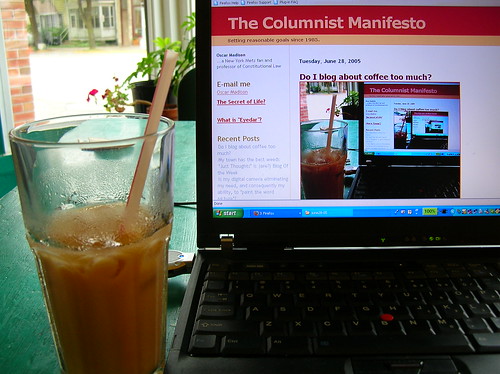
If you answer the above question in my comments, please try to come up with something more orignal than, "Maybe, but you clearly have too much time on your hands," or some variant of that. Thanking you in advance.
Let me point out that it took me only about 10 minutes to set up the above photo, featuring the World's Best Iced Coffee (at Grandma Moses). You have to admit the photo is devilishly clever (or is it just another one of those "Amsterdam great ideas"?).
Anyway, it's my blog and I can do what I want. Besides, as some of my blogging colleagues recognize, coffee is an important blogging topic. Take any blog written on occasion on laptops at coffee shops, and you don't have to look far to find a post (particulary a picture post) about coffee.
Left: Nina "latte" Camic has several coffee photos each month. [Photo by Nina.]
Center: Althouse, in characteristic pose with coffee cup. [Sculpture and photo by Moral Turpitude]
Right: Moral Turpitude self portrait: picking her nose or sniffing a tiny demitasse?
Center: Althouse, in characteristic pose with coffee cup. [Sculpture and photo by Moral Turpitude]
Right: Moral Turpitude self portrait: picking her nose or sniffing a tiny demitasse?
Perhaps there's a correlation between coffee-related posts and digital cameras. Coffee is very photogenic.
Maybe us "coffee bloggers" should get together and do a daily coffee blog. Then all my coffee related posts would be diverted there.
***
RETRO UPDATE: Answer: "yes." So said Tonya, in a remarkably pointed pre-response to this post -- written two days ago! I don't know how I missed it.
**
Post-Poland Reflection: Meet TINA
The woman who explained TINA was not named Tina, but Magda. “TINA” refers to the triumph of free market capitalism over all other forms of economic-social organization, especially communism. Literally, it stands for the phrase “There Is No Alternative.”
TINA is often smug, sometimes a pragmatic recognition that life is imperfect. One can say of free market capitalism, as Churchill said of democracy, that it is “the worst system of governance except all those other systems which have been tried from time to time.”
It’s interesting to think about TINA in the context of Poland, which is only about 15 years into its transition. Magda herself, a sociologist, was on her way to a symposium called “Anti-TINA.” Poland is apparently part of what seems to be a trend throughout Europe (and I fear the United States) of throwing out babies with the bathwater – of moving continually rightward and dismantling the social welfare safety net in favor of sink or swim laissez faire economics.
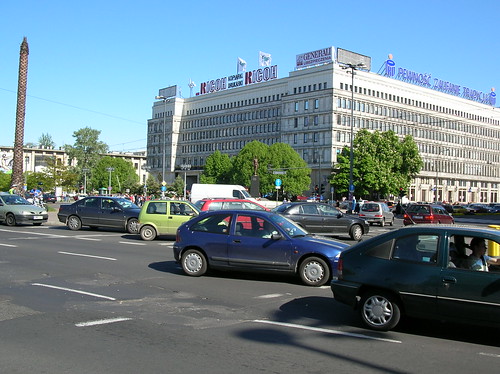
Former communist party buildings now festooned with corporate logos...
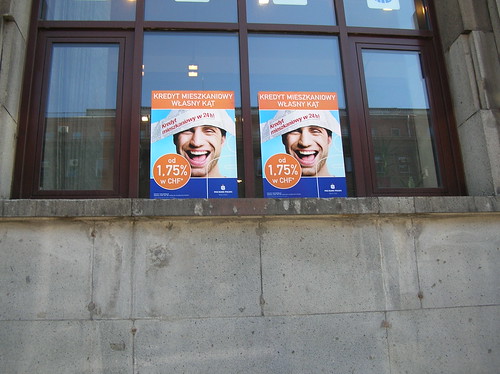
... and ads for interest rates.
There are strikingly few fat people in Poland, compared to the west (especially here in the U.S.). My new theory is that it’s because there just wasn’t so much junk food and fast food commercially available under communism. That could be about to change.
KFC, Warsaw. McD's, Krakow.
The stores are filled with merchandise now. Is consumer choice an unalloyed good thing? Check out those shoes!
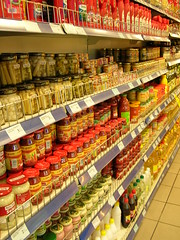
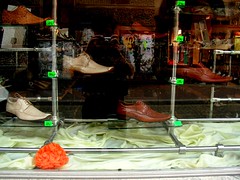
Nina’s sister says that the ubiquitous graffiti in Poland appeared very suddenly as the free market brought widespread availability of spray paint in stores.
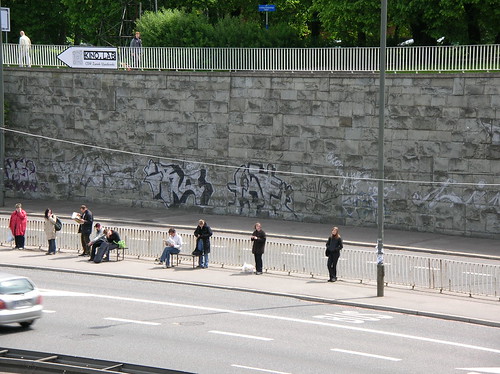
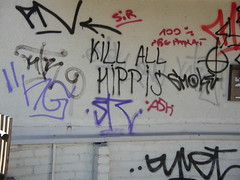
Poland had more car makes on their streets than anyplace I've ever been. The U.S. and ever car-manufacturing nation in the world seemed to be represented. More cars, trending bigger. That's the old Fiat "Polska" (serioussly, not making that up) alongside a bigger, newer Audi.
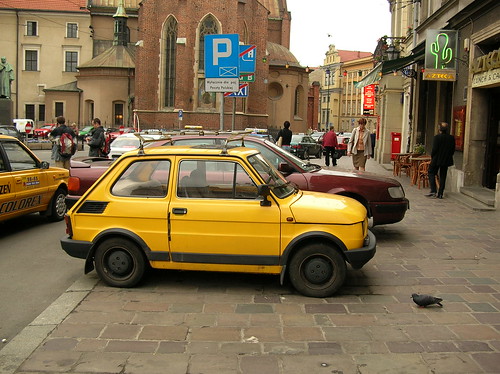
Uh, oh -- an SUV makes its sinister appearance on Krakow's narrow streets.
What is it about free markets and sex? These porn handbills were littering the streets all over Warsaw.
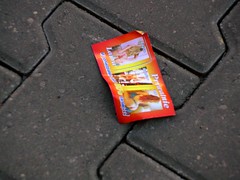
And of course, sex and advertizing go hand in hand. Sex appeal on Polish billboards -- not terribly subtle.
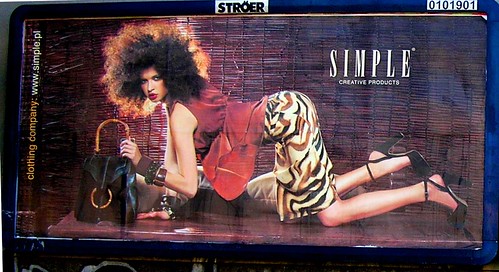
Finally, free market capitalism means boom and bust. Poland is going through a serious economic slump. One sign: the boom led to a Polish version of the "McMansion craze" seen in the U.S., but when the bust came, a lot of homeowners ran out of money to finish their building projects.
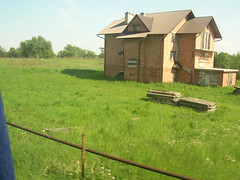
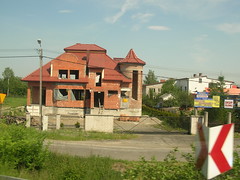
These unfinished houses are a common sight in the Polish suburban and rural landscape.
BELOW: Communist era housing. So it's not beautiful, but it's decent and affordable, and there's a humane concept at work: there are parks, shops and, below right, a high school all within the housing complex.
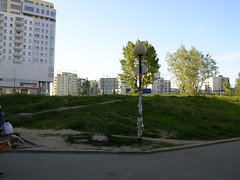
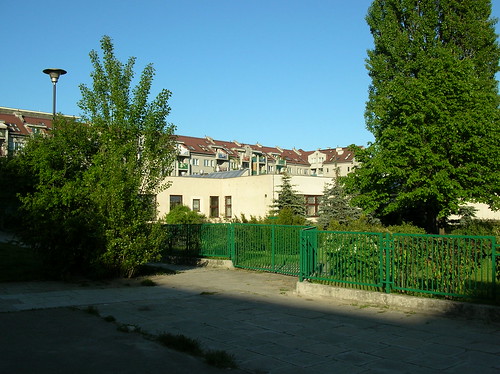
So are there alternatives?
***
Capitalist growing pains, Warsaw. Expensive shoes, resentful graffiti, anti-U.S. sentiment.
TINA is often smug, sometimes a pragmatic recognition that life is imperfect. One can say of free market capitalism, as Churchill said of democracy, that it is “the worst system of governance except all those other systems which have been tried from time to time.”
It’s interesting to think about TINA in the context of Poland, which is only about 15 years into its transition. Magda herself, a sociologist, was on her way to a symposium called “Anti-TINA.” Poland is apparently part of what seems to be a trend throughout Europe (and I fear the United States) of throwing out babies with the bathwater – of moving continually rightward and dismantling the social welfare safety net in favor of sink or swim laissez faire economics.

Former communist party buildings now festooned with corporate logos...

... and ads for interest rates.
There are strikingly few fat people in Poland, compared to the west (especially here in the U.S.). My new theory is that it’s because there just wasn’t so much junk food and fast food commercially available under communism. That could be about to change.
KFC, Warsaw. McD's, Krakow.
The stores are filled with merchandise now. Is consumer choice an unalloyed good thing? Check out those shoes!


Nina’s sister says that the ubiquitous graffiti in Poland appeared very suddenly as the free market brought widespread availability of spray paint in stores.


Poland had more car makes on their streets than anyplace I've ever been. The U.S. and ever car-manufacturing nation in the world seemed to be represented. More cars, trending bigger. That's the old Fiat "Polska" (serioussly, not making that up) alongside a bigger, newer Audi.

Uh, oh -- an SUV makes its sinister appearance on Krakow's narrow streets.
What is it about free markets and sex? These porn handbills were littering the streets all over Warsaw.

And of course, sex and advertizing go hand in hand. Sex appeal on Polish billboards -- not terribly subtle.

Finally, free market capitalism means boom and bust. Poland is going through a serious economic slump. One sign: the boom led to a Polish version of the "McMansion craze" seen in the U.S., but when the bust came, a lot of homeowners ran out of money to finish their building projects.


These unfinished houses are a common sight in the Polish suburban and rural landscape.
BELOW: Communist era housing. So it's not beautiful, but it's decent and affordable, and there's a humane concept at work: there are parks, shops and, below right, a high school all within the housing complex.


So are there alternatives?
***
Monday, June 27, 2005
My town has the best weeds
"Just Thoughts" is (are?) Blog Of the Week
Did you know that, with nothing more than a simple plastic fork, a pen and a post-it note, you can sculpt a beautiful toy giraffe? Well, maybe you can't, but Janel can. This alone is worth Blog Of the Week™ honors, but Janel's blog Just Thoughts is so much more than sculpture.
Blogging since January, Janel has exactly 100 posts, all of them witty, and she inspires and shames me by consistently managing to say something pointed in very few words. And she has a great eye for simile.
I've chosen these links to her posts quite randomly -- they're all good. She is even funny talking about the weather!
I just wish Janel would post more often. And put in more of her great photo commentaries. One can dream...
**
Blogging since January, Janel has exactly 100 posts, all of them witty, and she inspires and shames me by consistently managing to say something pointed in very few words. And she has a great eye for simile.
Janel (or Janel Rene?), author of Just Thoughts.
I've chosen these links to her posts quite randomly -- they're all good. She is even funny talking about the weather!
I just wish Janel would post more often. And put in more of her great photo commentaries. One can dream...
**
Is my digital camera eliminating my need, and consequently my ability, to "paint the word picture"?
Isn't one of the great things about having a digital camera the ability to make an impromptu visual record of ... well, anything?
And yet there seems to be a down side. Writers who are not visual artists have to "paint the word picture." Radio sportscasters, in contrast to their TV colleagues, have to "paint the word picture." I've always had to paint the word picture.
This morning, for example, while B is out of town on an overnight trip, the dishwasher (a movable model on casters that we roll in front of the sink to operate) left some sludgey residue on our kitchen floor -- a small puddle no larger than a banana. Would that word picture freak B out?
Or would it be better to show her this:
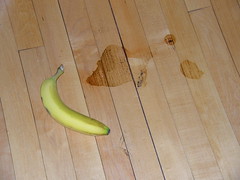
I'm at a loss.
NOTE: The banana didn't fall out of the dishwasher with the sludge. Nor did it just happen to be there. I placed it there for scale.
DIGRESSION: The banana seemed a bit tasteless at first, but turned out quite delicious. I realized that I had not eaten a banana the whole time I was in Europe, and had some exaggerated expectations about how it was supposed to taste. I have to add it to my list of "things I didn’t miss at the time, but really liked getting back to."
**
And yet there seems to be a down side. Writers who are not visual artists have to "paint the word picture." Radio sportscasters, in contrast to their TV colleagues, have to "paint the word picture." I've always had to paint the word picture.
This morning, for example, while B is out of town on an overnight trip, the dishwasher (a movable model on casters that we roll in front of the sink to operate) left some sludgey residue on our kitchen floor -- a small puddle no larger than a banana. Would that word picture freak B out?
Or would it be better to show her this:

I'm at a loss.
NOTE: The banana didn't fall out of the dishwasher with the sludge. Nor did it just happen to be there. I placed it there for scale.
DIGRESSION: The banana seemed a bit tasteless at first, but turned out quite delicious. I realized that I had not eaten a banana the whole time I was in Europe, and had some exaggerated expectations about how it was supposed to taste. I have to add it to my list of "things I didn’t miss at the time, but really liked getting back to."
**
Sunday, June 26, 2005
Incoherent museum-curating, funky use of storage space, or strangely evocative message of peace?
___
Photos taken on June 19, 2005, at the warplane exhibition, Royal Museum of the Army and Military History, Brussels.
***
Photos taken on June 19, 2005, at the warplane exhibition, Royal Museum of the Army and Military History, Brussels.
***
Travel memes
I'm still waiting for someone to tell me authoritatively what a "meme" is. Meanwhile, these:
1. Ice. Actually, on my last day in Amsterdam, I closed my finger in a big heavy door, and badly needed to ice it down. I went to the stoner grocery looking for a bag of frozen peas to use as an ice pack – didn’t find any, but discovered that frozen green beans work just as well.
2. TV (including videos and DVDs). We had a TV in practically every place we stayed, but never watched. Just in the last few days of our trip, B and I did get a TV hankering. It was in Brussels, we were tired, so we did dinner and a movie in the room. It was the best room service meal I’ve ever had in my life (fois gras and bouillabaise), and we got DVDs from the reception desk. But we ended up watching European TV, which is fascinating, even if you don’t understand the language.
3. My cell phone. Yeah, they're super convenient at times, but -- just as I've suspected -- you really don't need them.
4. SUVs. Okay this one’s a cheat. I hate SUVs. They’re aren’t many in Europe, which almost, but not quite, makes up for the cigarette smoke.
5. Driving everywhere. We had a rental car for a good part of the trip, but not always, and not in Poland or Berlin. In Europe, you just walk more – it’s a combination of not having a car, or wanting to deal with having one in a city, not wanting to spring for cabs, and not wanting to figure out the public transportation system every time you need to move. Walking is great. I’m going to try it here.
1. Iced coffee. Does this contradict number 1 above? Not exactly.
2. My bed. Firm yet yielding. High off the floor. Mmmm.
3. Summer mornings in familiar surroundings.
4. American humor. That night in Brussels, after five weeks abroad, when we broke down and watched TV, we finally surfed onto a BBC broadcast of Jon Stewart’s Daily Show, International Edition. It was so unbelievably funny that I was emitting my rare, helpless, laugh-til-I-cry high-pitched laugh. Jon, I love you, man! I missed you!
5. Time to read. This was weird. Between sightseeing and travelblogging, I just didn’t have much down time for reading. I didn’t really notice, since there was so much mental stimulation from travel, but still...
1. I can pick fights over the stupidest sh*t. Example: B and I took slightly diverging paths crossing the street, in which she reached the sidewalk by threading between two tightly parked cars, whereas I walked through a large vacant parking space. I said: “Why the hell did you cross over there?”
2. The travelers' perception paradox. Even as I bumbled around not knowing the language or how to get from point A to point B, my sense perceptions seemed sharpened. So I’m not entirely stupid when abroad. Also, little things fascinate me, and I want to comment on everything. Duh, right? What am I going to blog about now that I’m home?
3. Peasant food. I really like mittel-European“peasant” food. I guess it’s in my genes. Potatoes, cabbage, root vegetables, soup from root vegetables, thick bread and meat. Every kind of meat they can throw at me. Well, maybe not blood sausage.
4. Travel style. My favorite way to experience other countries is to form some sort of a routine as a base, and tour around off of that. I think that’s why I made such a big deal over the daily coffee-getting ritual. (That and the fact that I’m really not nice to be with if I haven’t had my coffee.) Having a work-related reason to be in a place – the U of Boogie gig, for instance – and touring around off of that, rather than travel purely as a tourist, was ideal. Sightseeing is cool, but my favorite times, e.g., in Berlin, were when we had pretty much covered the obligatory amount of sightseeing and I was just doing my version of hanging out: wandering in and out of shops, finding my way on public transportation, spending unconscionable amounts of time in coffee houses and cafes, taking pictures of people on bicycles.
5. Getting lost. I'm usually capable of regarding getting lost as an inevitable part of travel, and often even part of the adventure. Though apparently I can get so badly lost in a city that I will come to hate it.
***
Five things I can go without for five weeks
without missing at all
without missing at all
1. Ice. Actually, on my last day in Amsterdam, I closed my finger in a big heavy door, and badly needed to ice it down. I went to the stoner grocery looking for a bag of frozen peas to use as an ice pack – didn’t find any, but discovered that frozen green beans work just as well.
2. TV (including videos and DVDs). We had a TV in practically every place we stayed, but never watched. Just in the last few days of our trip, B and I did get a TV hankering. It was in Brussels, we were tired, so we did dinner and a movie in the room. It was the best room service meal I’ve ever had in my life (fois gras and bouillabaise), and we got DVDs from the reception desk. But we ended up watching European TV, which is fascinating, even if you don’t understand the language.
3. My cell phone. Yeah, they're super convenient at times, but -- just as I've suspected -- you really don't need them.
4. SUVs. Okay this one’s a cheat. I hate SUVs. They’re aren’t many in Europe, which almost, but not quite, makes up for the cigarette smoke.
5. Driving everywhere. We had a rental car for a good part of the trip, but not always, and not in Poland or Berlin. In Europe, you just walk more – it’s a combination of not having a car, or wanting to deal with having one in a city, not wanting to spring for cabs, and not wanting to figure out the public transportation system every time you need to move. Walking is great. I’m going to try it here.
Five things I didn’t miss at the time,
but really liked getting back to
but really liked getting back to
1. Iced coffee. Does this contradict number 1 above? Not exactly.
2. My bed. Firm yet yielding. High off the floor. Mmmm.
3. Summer mornings in familiar surroundings.
4. American humor. That night in Brussels, after five weeks abroad, when we broke down and watched TV, we finally surfed onto a BBC broadcast of Jon Stewart’s Daily Show, International Edition. It was so unbelievably funny that I was emitting my rare, helpless, laugh-til-I-cry high-pitched laugh. Jon, I love you, man! I missed you!
5. Time to read. This was weird. Between sightseeing and travelblogging, I just didn’t have much down time for reading. I didn’t really notice, since there was so much mental stimulation from travel, but still...
Five things I’ve learned about myself as a world traveler
1. I can pick fights over the stupidest sh*t. Example: B and I took slightly diverging paths crossing the street, in which she reached the sidewalk by threading between two tightly parked cars, whereas I walked through a large vacant parking space. I said: “Why the hell did you cross over there?”
2. The travelers' perception paradox. Even as I bumbled around not knowing the language or how to get from point A to point B, my sense perceptions seemed sharpened. So I’m not entirely stupid when abroad. Also, little things fascinate me, and I want to comment on everything. Duh, right? What am I going to blog about now that I’m home?
3. Peasant food. I really like mittel-European“peasant” food. I guess it’s in my genes. Potatoes, cabbage, root vegetables, soup from root vegetables, thick bread and meat. Every kind of meat they can throw at me. Well, maybe not blood sausage.
4. Travel style. My favorite way to experience other countries is to form some sort of a routine as a base, and tour around off of that. I think that’s why I made such a big deal over the daily coffee-getting ritual. (That and the fact that I’m really not nice to be with if I haven’t had my coffee.) Having a work-related reason to be in a place – the U of Boogie gig, for instance – and touring around off of that, rather than travel purely as a tourist, was ideal. Sightseeing is cool, but my favorite times, e.g., in Berlin, were when we had pretty much covered the obligatory amount of sightseeing and I was just doing my version of hanging out: wandering in and out of shops, finding my way on public transportation, spending unconscionable amounts of time in coffee houses and cafes, taking pictures of people on bicycles.
5. Getting lost. I'm usually capable of regarding getting lost as an inevitable part of travel, and often even part of the adventure. Though apparently I can get so badly lost in a city that I will come to hate it.
***
Friday, June 24, 2005
Coming home
Which end is up?
I awoke this morning at 5 a.m. My sleep patterns are disturbed by jet lag from yesterday's 24-hour marathon of westbound air travel, yet the dawn was beautiful and its a delicious summer morning in my hometown. I'm sad my trip is over, but the summer is full of promise and I'm euphoric about being home.
Jet lag and time zone change are very disorienting. And my grip on what day and time it is has been badly shaken by this: B and I didn't make phone calls or call in for messages from Europe, assuming, I guess, that anyone who really needed to get in touch would send email. When I got home, there was a message on my answering machine from the sister of my friend R: "I have some news about R-- please call. We're at R's apartment. It's Wednesday the 25th."
R was diagnosed with breast cancer several years ago. I have known her since 4th grade. She was the first girl to break my heart in high school. She was in remission.
"Wednesday the 25th," of course, was last month. I called R's apartment -- the number was disconnected. I called R's sister's cell phone and got voice mail.
I googled "R--" and found her obituary. She died "of cerebral hemorrhage due to complications from cancer treatment" a few days after I left the country.
So the "world" I left behind last May is now very different.
This morning I walked to Grandma Moses, my favorite coffee shop, and got there just after 6:30, when it's supposed to be open. It was dark and locked, and I wondered if maybe I had set my watch to the wrong time zone.
Then a familiar face, riding up on a bike. A former student. Yes, it's after 6:30 and the place is supposed to be open. We chat: Where can we go at this hour and get both coffee and free internet? I think about it for a minute and rattle off the names of three places.
Then the barista shows up. I sort of know her -- I clap and say "woo! hoo!" and we banter. She doesn't want a lot of people coming in and demanding coffee before she's set the place up for business, but she says we can come in and use the wifi while she gets the coffee going, as long was we lock the door behind us.
It occurs to me that it's so nice to have that kind of rapport after three days of scowling Dutch tourism-jaded waitrons. It occurs to me that I not only speak the local language fluently, but I know my way around well enough to give directions. It occurs to me that I should get a bike. And the iced coffee is delicious.
***
I awoke this morning at 5 a.m. My sleep patterns are disturbed by jet lag from yesterday's 24-hour marathon of westbound air travel, yet the dawn was beautiful and its a delicious summer morning in my hometown. I'm sad my trip is over, but the summer is full of promise and I'm euphoric about being home.
Jet lag and time zone change are very disorienting. And my grip on what day and time it is has been badly shaken by this: B and I didn't make phone calls or call in for messages from Europe, assuming, I guess, that anyone who really needed to get in touch would send email. When I got home, there was a message on my answering machine from the sister of my friend R: "I have some news about R-- please call. We're at R's apartment. It's Wednesday the 25th."
R was diagnosed with breast cancer several years ago. I have known her since 4th grade. She was the first girl to break my heart in high school. She was in remission.
"Wednesday the 25th," of course, was last month. I called R's apartment -- the number was disconnected. I called R's sister's cell phone and got voice mail.
I googled "R--" and found her obituary. She died "of cerebral hemorrhage due to complications from cancer treatment" a few days after I left the country.
So the "world" I left behind last May is now very different.
This morning I walked to Grandma Moses, my favorite coffee shop, and got there just after 6:30, when it's supposed to be open. It was dark and locked, and I wondered if maybe I had set my watch to the wrong time zone.
Then a familiar face, riding up on a bike. A former student. Yes, it's after 6:30 and the place is supposed to be open. We chat: Where can we go at this hour and get both coffee and free internet? I think about it for a minute and rattle off the names of three places.
Then the barista shows up. I sort of know her -- I clap and say "woo! hoo!" and we banter. She doesn't want a lot of people coming in and demanding coffee before she's set the place up for business, but she says we can come in and use the wifi while she gets the coffee going, as long was we lock the door behind us.
It occurs to me that it's so nice to have that kind of rapport after three days of scowling Dutch tourism-jaded waitrons. It occurs to me that I not only speak the local language fluently, but I know my way around well enough to give directions. It occurs to me that I should get a bike. And the iced coffee is delicious.
***
Wednesday, June 22, 2005
Last insightful thoughts before leaving Amsterdam
Some friendly advice regarding retail marketing operations in Europe
Still on a roll in Amsterdam. Hey, local merchants? Listen up. Unless there is a disproportionate number of cat-lovers in Amsterdam, and you plan to do business only with them, then you really need to rethink the whole cat-in-the-display thing.
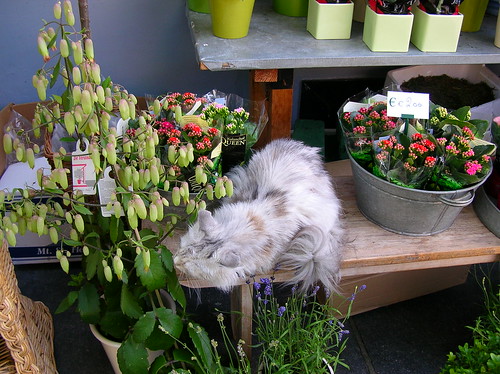
Okay, so that’s kind of cute, unless you’ve had a lot of experience with finding cat poo in your flower pots. But I’m less convinced about the appeal of this:
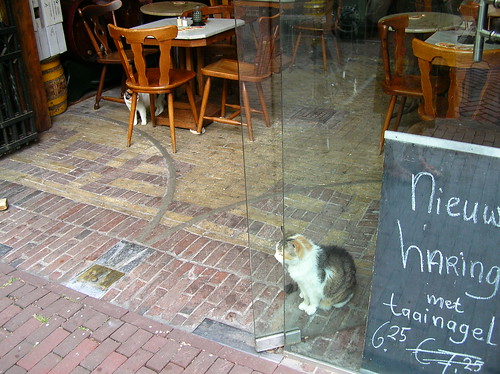
Note that the restaurant has had to slash its prices for "new herring" and is still totally empty at about 8 p.m.
Finally, this simply does not work for me – even if that’s only display bread.
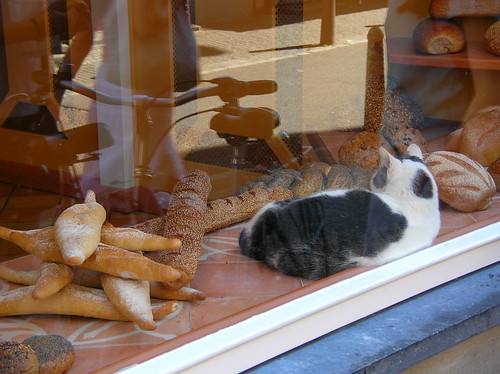
Taking a broader look around Europe, it occurs to me that the names of many European products and services would have to be changed for successful sales in the U.S. Remember the story about how the Chevrolet "Nova" had trouble selling in Latin America because "no va" means "no go" or "doesn’t work" in Spanish? I can’t say that I saw anything quite so good here in Europe, but here are a few anyway.
Our grocery store in Boogie, Germany was an outlet of a very successful chain of grocery superstores. It’s name? Toom.
Here is a very popular bottled juice found in Belgium and the Netherlands. If you drink it in the U.S., you are a ___
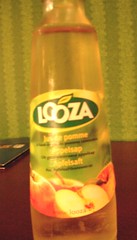
Easier to market, but with some risk of sending the wrong message: Beligum’s "Hoegaarden Beer." The Hoegaarden coasters looked, at first glance, like Europe’s most dull and artless beer coasters,
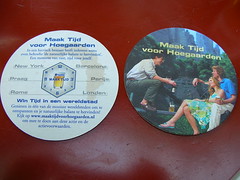
but on further inspection, there may be more to them:
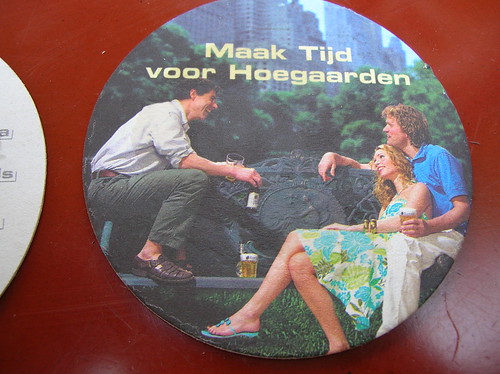
What exactly goes on in the Hoegaarden? Check out their "Forbidden Fruit" beer, here.
Finally, Germany’s "Sportlife" chewing gum seems well enough –
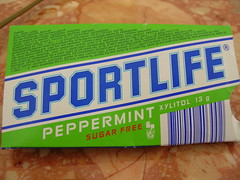
– until you check out the ad on the back of the wrapper:
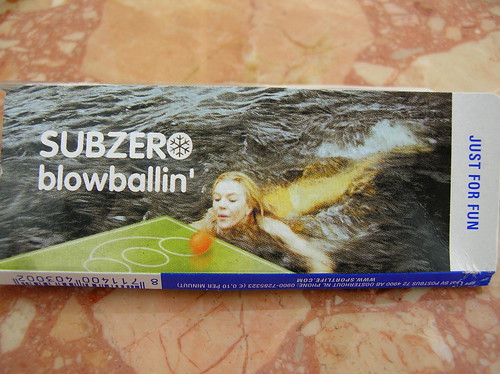
Whuh??? I think "Sportlife" needs to lose that ad on the back. Or, I don’t know, maybe keep it.
**
Still on a roll in Amsterdam. Hey, local merchants? Listen up. Unless there is a disproportionate number of cat-lovers in Amsterdam, and you plan to do business only with them, then you really need to rethink the whole cat-in-the-display thing.

Okay, so that’s kind of cute, unless you’ve had a lot of experience with finding cat poo in your flower pots. But I’m less convinced about the appeal of this:

Note that the restaurant has had to slash its prices for "new herring" and is still totally empty at about 8 p.m.
Finally, this simply does not work for me – even if that’s only display bread.

Taking a broader look around Europe, it occurs to me that the names of many European products and services would have to be changed for successful sales in the U.S. Remember the story about how the Chevrolet "Nova" had trouble selling in Latin America because "no va" means "no go" or "doesn’t work" in Spanish? I can’t say that I saw anything quite so good here in Europe, but here are a few anyway.
Our grocery store in Boogie, Germany was an outlet of a very successful chain of grocery superstores. It’s name? Toom.
Here is a very popular bottled juice found in Belgium and the Netherlands. If you drink it in the U.S., you are a ___

Easier to market, but with some risk of sending the wrong message: Beligum’s "Hoegaarden Beer." The Hoegaarden coasters looked, at first glance, like Europe’s most dull and artless beer coasters,

but on further inspection, there may be more to them:

What exactly goes on in the Hoegaarden? Check out their "Forbidden Fruit" beer, here.
Finally, Germany’s "Sportlife" chewing gum seems well enough –

– until you check out the ad on the back of the wrapper:

Whuh??? I think "Sportlife" needs to lose that ad on the back. Or, I don’t know, maybe keep it.
**
Subscribe to Comments [Atom]
